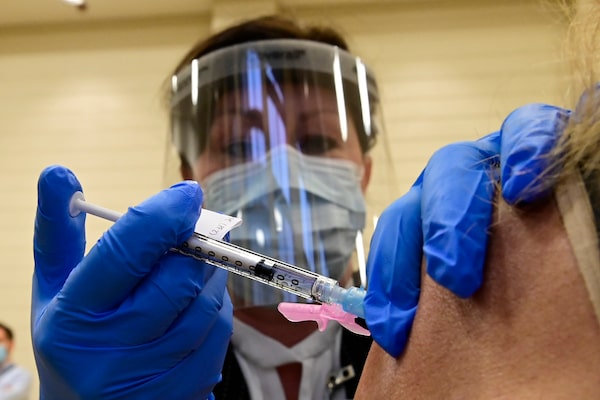
A COVID-19 vaccine is administered in Toronto on Dec. 14, 2020.Frank Gunn/The Canadian Press
Scientists who are mounting the largest independent study of vaccine safety in Canadian history are seeking the participation of hundreds of thousands of people across the country – including those who have not yet been vaccinated for COVID-19 – to get the information they need.
The results of the study, to be released in regular instalments over the coming months, are intended to yield a fine-grained look at adverse reactions to COVID-19 vaccines. They may also be a reassuring source of information for those who feel that they don’t yet know enough to decide whether to be vaccinated.
“I think demonstrating that we’re using safe vaccines is incredibly important – and I think the only way we can address [vaccine] hesitancy for some people is to do that and to do it well,” said Julie Bettinger, a vaccine safety scientist with the British Columbia Children’s Hospital in Vancouver, and lead researcher on the multicentre study.
The federally funded project is the work of the Canadian National Vaccine Safety Network (CANVAS) and is based on similar research conducted on seasonal flu vaccines for more than a decade. But those studies typically involve tens of thousands of participants. CANVAS researchers aim to collect data from up to 450,000 Canadians for each COVID-19 vaccine being administered. With two vaccines already authorized, that means nearly one million participants are being sought.
“It’s come with some real opportunities and, I would say, some real challenges, from a data perspective,” Dr. Bettinger said.
The study is separate from the routine reporting of adverse effects that health care providers are required to do when administering vaccines. That information works its way to the federal government via provincial and territorial health agencies.
For example, the most recent data indicate that, as of Feb. 12, a total of 957 adverse events followed immunization, with 140 listed as serious. Meanwhile, a total of 1.2 million doses were administered by that date (with each person requiring two doses to be fully vaccinated against COVID-19).
The government’s system is passive in that it relies on incoming reports and does not otherwise track people who have received vaccines. Experts say this works for capturing events that are severe and rare. However, it can miss more subtle effects.
The CANVAS study will actively survey participants and track health outcomes after vaccination. It is also designed to include a control group of about 50,000 people who have not yet been vaccinated to help discern whether adverse effects that are reported are connected to vaccination.
The study may be able to rule out a connection in many cases, said Matthew Muller, an infectious disease physician with the Unity Health group in Toronto, who is leading the Ontario arm of the study.
“Some people are going to have health issues that arise in the week that they get their vaccine, just purely by coincidence,” Dr. Muller added.
The numbers the study is aiming for are greater than those that were used to measure the safety and efficacy of the vaccines in Phase III clinical trials. While those trials remain the scientific gold standard for the vaccines, the CANVAS project could yield more precise safety data on different population groups within Canada, including some that were left out of the Phase III trials. It could also spot problems with a particular lot or shipment of vaccines.
Dr. Bettinger added that the researchers do not want to delay anyone from receiving a vaccine. People in the control group will move into the vaccinated group after their first dose. Those who begin in the vaccinated group will be asked to respond to questions about their health before they got the vaccine.
Nicole Basta, an epidemiologist at McGill University who is not involved in the project, said the CANVAS study will provide an important complement to the government’s surveillance system.
“Together, they will give us the most complete information possible to detect, investigate, and verify any concerns that may arise about COVID-19 vaccines,” she said.
She added that the CANVAS study is similar to vaccine safety tracking efforts in other countries, but goes a step further than some because it will use a control group
Those wishing to participate in the CANVAS-COVID study can enroll online. The study will ultimately include participants from at least seven regions including B.C., Yukon, Alberta, Ontario, Quebec, Nova Scotia and Prince Edward Island. Some regions are still preparing to launch their portion the study, including Ontario, which aims to be able to enroll participants next week, Dr. Muller said.
Our Morning Update and Evening Update newsletters are written by Globe editors, giving you a concise summary of the day’s most important headlines. Sign up today.
 Ivan Semeniuk
Ivan Semeniuk